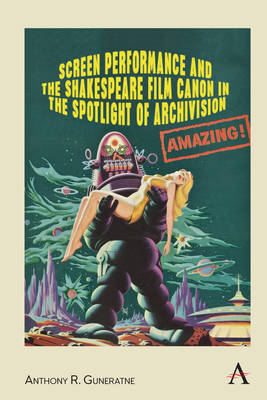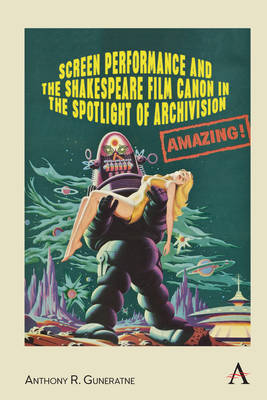
- Afhalen na 1 uur in een winkel met voorraad
- In januari gratis thuislevering in België
- Ruim aanbod met 7 miljoen producten
- Afhalen na 1 uur in een winkel met voorraad
- In januari gratis thuislevering in België
- Ruim aanbod met 7 miljoen producten
Screen Performance and the Shakespeare Film Canon in the Spotlight of Archivision
Anthony R GuneratneOmschrijving
A must-read work for Shakespeare scholars and students of film adaptations, this multi-faceted book accounts for increasingly sophisticated interdisciplinary approaches to Shakespeare Studies, with Shakespeare-based films serving as an ideal model for the ongoing transformations of many disciplinary fields.
A valedictory public donation by a celluloid-loving collector includes, unbeknownst to him, the earliest extant feature-length film made in the United States. A digitization of a catalogue of archival holdings leads to the chance discovery of a fragment of the earliest known adaptation of Shakespeare onto a celluloid-based medium. An amateur literary sleuth compares an understudied Renaissance manuscript to verbal echoes in Shakespeare's plays and so establishes a pattern of quotations in the playwright's History cycles. Narratologist Gérard Genette proposes approaches to texts that supplement an existing version (i.e. paratexts) which begins to be taken up by individual Shakespeare scholars almost two generations after the event. The microhistorian Carlo Ginzburg proposes the simultaneous application of a constellation of critical methodologies to the detailed analysis of discrete phenomena. A computer-assisted breakthrough in statistical modelling revolutionizes our understanding of Shakespeare's texts and working practices, even offering the strongest available proof that manuscript pages long believed to be his are not only part of a canon but in his own hand.
A catalogue such as this may seem like a random collection of events, but in fact they are profoundly interconnected. Quite simply, a revolution has taken place in Shakespeare studies with overwhelming consequences to debates about canonicity and canon formation, one that has yet to come to film studies as systematically and consequentially. On its own account, the historical study of documentation has advanced greatly in the latter field (vide the activities of the DOMITOR group of film historians and the collective enterprise of such established journals as Film History and Film and History and such newer ones as The Journal of Visual Culture and The Journal of Contemporary Archival Studies). But until recently film historians and those who restore, preserve and exhibit films occupied separate realms, the former grounded in the humanities and the latter in the natural sciences. Adaptations of Shakespeare help us bridge that gap, and this is the book that brings the most salient contributions in these disparate fields into a unified whole.
In the process the book also contributes to the furtherance of those interdisciplinary intersections by using Shakespeare's oeuvre and adaptations of it as an illustrative model. Its guiding principles are the twin concepts of microcline history and archivision, which together suggest radically new approaches to the search for once extant but now lost films, for films that never attained completion, and even those few celebrated rediscoveries that have fleshed out the bonier parts of the medium's narrative history. Indeed, it is the work's overriding contention that the synthesis of approaches it effects allows us to reconstruct one of the most extraordinary transmedial and intermedial performance histories in any art form. By offering a new way of seeing and hearing this immense and growing canon of audio-visual interpretations that span the entire history of filmmaking in a variety of national and international contexts, this book strives to deploy the model of Shakespearean canonformation to invigorate and even transform approaches found in a number of disciplinary terrains: film history, media archaeology, audio-visual narratology and text-analysis, and, above all, performance practices in their increasingly multi-medial fluidity.
Specificaties
Betrokkenen
- Auteur(s):
- Uitgeverij:
Inhoud
- Aantal bladzijden:
- 250
- Taal:
- Engels
- Reeks:
Eigenschappen
- Productcode (EAN):
- 9781839982699
- Verschijningsdatum:
- 8/09/2026
- Uitvoering:
- Hardcover
- Formaat:
- Genaaid
- Afmetingen:
- 152 mm x 229 mm
- Gewicht:
- 453 g

Alleen bij Standaard Boekhandel
Beoordelingen
We publiceren alleen reviews die voldoen aan de voorwaarden voor reviews. Bekijk onze voorwaarden voor reviews.









